
Eden by Jim Crace
Picador, 272pp, £16.99
The gardeners of eden want for neither food nor shelter. The trees groan with fruit and the fish-pond is well stocked; the labourers sleep in dormitories, surveilled by feathered angel overseers. But this paradise is also a prison: eden’s citizens are not allowed outside its walls, where hunger is rife (alms are pushed through the gates for the needy to take). Disobedience is met with violence, dissent with expulsion: the story of Adam and Eve is repeated as a warning. When an orchard worker decides she must see what lies beyond “eden’s sublime uniformity”, her escape destabilises the community and threatens the sanctity of the garden.
Jim Crace’s socialist politics have always infused his fiction, and in Eden the preoccupation with power, class, poverty and inequality that lay behind his previous two novels, The Melody and Harvest, rises up and pushes against the fable-like narrative and fecund prose. He captures the dullness of life in eden almost too well: at times the action, related by a series of characters in overlapping accounts, slackens. But his portrait of a society in which structural power and inequality are entrenched and liberty is constrained contains a powerful critique not only of religion but of the modern state and its anti-democratic turn.
By Tom Gatti
Re-Sisters: The Lives and Recordings of Delia Derbyshire, Margery Kempe and Cosey Fanni Tutti by Cosey Fanni Tutti
Faber & Faber, £18.99, 400pp
Re-Sisters details the parallels between Margery Kempe, a 15th-century Christian mystic, and Delia Derbyshire, the electronic music pioneer who arranged the original Doctor Who theme tune. It’s an idiosyncratic premise, made even more eccentric by Cosey Fanni Tutti’s inclusion of her own life story as the narrative’s third part. But Tutti, an avant garde artist and musician best known as a member of Throbbing Gristle and Chris & Cosey, handles her huge array of historical material with the enthusiasm and dedication of an academic.
In Re-Sisters she maps the lives of three creatives who have each been considered the “novelty woman” in their arena. She interrogates the idea of what it is to “record”: Kempe recorded her life in writing in the first known English-language autobiography; for Derbyshire, a “recording” involved sounds. In doing so Tutti’s exciting and inventive book makes the case for why we need to listen to those on society’s fringes.
By Ellen Peirson-Hagger
On Java Road by Lawrence Osborne
Hogarth, 240pp, £16.99
Lawrence Osborne, has, over the course of half a dozen novels, built up a discerning following. He has two great advantages as a writer of fiction: he is equally accomplished at both short stories and travel writing. The sparseness of the former and embedded detail of the latter are readily apparent in his novels about Westerners abroad, often in east and south-east Asia, made to confront their foreignness.
On Java Road is set in the Hong Kong of someone who knows the place well – its local restaurants, tower blocks and population groups rather than just its neon-lit facade. It is the time of student protests against the increasingly throttling grip of the Chinese state. The old friendship between a just-bumping-along expat English journalist Adrian Gyle and the plutocratic Jimmy Tang comes under pressure when Tang begins an affair with a beautiful pro-democracy protester named Rebecca. When she disappears, Gyle commits to finding out what happened, fully aware that the consequences will only damage him. Here Osborne updates the Graham Greene “entertainment” – social relationships are ambiguous, there’s menace in the air, conversations rarely mean just one thing – and it is all stylishly and adroitly handled.
By Michael Prodger
Return to My Trees: Notes From the Welsh Woodlands by Matthew Yeomans
Calon, 256pp, £18.99
The author and journalist Matthew Yeomans was already suffering from anxiety and panic attacks when the Covid lockdown of 2020 began. Reluctant to rely on medication and with gyms shut, he started to walk around his home city of Cardiff to find inner calm. Soon his short, urban meanderings turned into longer rambles through the woods.
Return to My Trees is the author’s tale of reconnecting with the natural world as he follows trails that loop their way through hills and valleys. The Welsh government plans to include hundreds of miles of these paths in a new National Forest, aimed at linking existing woodlands (many areas of which are ancient, and will need restoration) with new trees. Following them also offers Yeomans an immersion in the cultural and industrial history of Wales. National forests, he suggests, could help make nature an “integral part of a national identity”; a proposition that should spread far beyond the Welsh borders.
By Philippa Nuttall
[See also: Reviewed in short: New books by Jayne Buxton, Edward Enninful, Simon Heffer and Emma Donoghue]
This article appears in the 14 Sep 2022 issue of the New Statesman, Succession






